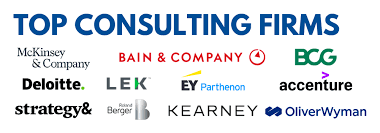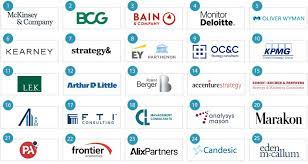Navigating Success: Unveiling the Power of Top Strategy Firms
Top Strategy Firms: Guiding Businesses Towards Success
In today’s complex and competitive business landscape, having a well-defined strategy is crucial for success. This is where top strategy firms play a pivotal role. These firms are renowned for their expertise in providing strategic guidance to businesses across various industries, helping them navigate challenges, seize opportunities, and achieve their goals.
One of the key advantages of engaging with a top strategy firm is the wealth of experience they bring to the table. These firms have a track record of working with some of the most successful companies globally, giving them insights into best practices, industry trends, and emerging market dynamics. Their expertise spans across different sectors, including technology, finance, healthcare, consumer goods, and more.
A distinguishing factor of top strategy firms is their ability to think analytically and critically. They excel at conducting thorough research and analysis to identify market trends, assess competition, and evaluate internal capabilities. By leveraging data-driven insights and rigorous methodologies, these firms help businesses make informed decisions that drive growth and profitability.
Collaboration lies at the heart of top strategy firms’ approach. They work closely with clients to understand their unique challenges and objectives. This collaborative process allows them to develop tailored strategies that align with the client’s vision while addressing specific pain points. Through workshops, brainstorming sessions, and ongoing communication, these firms ensure that all stakeholders are actively involved in shaping the strategic direction.
Another key strength of top strategy firms is their ability to provide innovative solutions. They bring fresh perspectives to the table by challenging conventional thinking and exploring new avenues for growth. Whether it’s identifying untapped markets or leveraging emerging technologies, these firms help businesses stay ahead of the curve and seize competitive advantages.
Furthermore, top strategy firms excel in change management. They understand that implementing a new strategy requires organizational alignment and effective execution plans. These firms assist businesses in developing robust implementation frameworks that facilitate seamless transitions while minimizing disruption.
Engaging with a top strategy firm also offers a competitive advantage when it comes to stakeholder management. These firms possess strong communication and negotiation skills, allowing them to effectively engage with key stakeholders, including investors, board members, and employees. They help businesses articulate their strategic vision, gain buy-in from stakeholders, and foster a culture of alignment and accountability.
Finally, top strategy firms provide ongoing support and guidance. They don’t just deliver a strategy and walk away; instead, they remain committed to their clients’ success in the long run. Through regular check-ins, progress assessments, and performance evaluation, these firms ensure that the strategy remains relevant and adaptable to changing market conditions.
In conclusion, top strategy firms play a vital role in guiding businesses towards success. Their expertise, analytical thinking, collaborative approach, innovative solutions, change management capabilities, stakeholder management skills, and ongoing support make them invaluable partners for organizations seeking to thrive in today’s dynamic business environment. By leveraging the services of these firms, businesses can gain a competitive edge and drive sustainable growth in an ever-evolving marketplace.
Frequently Asked Questions About Top Strategy Firms in the UK
- What are the top strategy firms in the UK?
- What services do top strategy firms offer?
- How much do top strategy firms charge for their services?
- What qualifications and experience do I need to work at a top strategy firm?
- How can I find out more about working at a top strategy firm?
What are the top strategy firms in the UK?
The UK is home to several top strategy firms that are renowned for their expertise and track record of delivering exceptional strategic guidance. While there are numerous reputable firms in the UK, here are some of the top strategy firms that consistently rank among the best:
- McKinsey & Company: McKinsey is a global leader in strategy consulting and has a strong presence in the UK. Known for its rigorous analytical approach and extensive industry experience, McKinsey advises clients on a wide range of strategic issues, including growth strategies, organizational transformations, and digital transformation.
- The Boston Consulting Group (BCG): BCG is another prominent strategy firm with a strong foothold in the UK market. BCG is known for its innovative thinking, emphasis on data-driven insights, and expertise in areas such as corporate strategy, operational improvement, and M&A advisory.
- Bain & Company: Bain is renowned for its client-centric approach and ability to deliver practical solutions that drive tangible results. With a focus on sectors such as private equity, consumer products, technology, and healthcare, Bain offers strategic advice on areas like performance improvement, customer experience optimization, and digital transformation.
- Strategy& (formerly Booz & Company): Strategy& combines deep industry knowledge with strategic expertise to help clients navigate complex challenges and capitalize on opportunities. Their services include corporate strategy development, mergers and acquisitions, innovation strategies, and operational improvement.
- Oliver Wyman: Oliver Wyman is known for its specialized industry practices that cover sectors such as financial services, aviation, energy, retail, healthcare, and more. Their strategic consulting services encompass areas like market entry strategies, pricing optimization, risk management strategies, and digital transformation.
- Roland Berger: Roland Berger is a leading global consulting firm with a strong presence in the UK market. They offer strategic advice across various industries including automotive, energy & utilities, financial services, telecommunications etc., helping clients with growth strategies as well as operational and organizational transformations.
These firms have established themselves as trusted advisors to businesses across the UK, providing strategic insights and helping organizations navigate complex challenges. It’s worth noting that the ranking and reputation of strategy firms may vary depending on industry focus, client feedback, and specific project requirements. Therefore, it’s always recommended to conduct thorough research and consider the unique needs of your business when selecting a strategy firm.
What services do top strategy firms offer?
Top strategy firms offer a range of services designed to help businesses develop and execute effective strategies. Some of the key services provided by these firms include:
- Strategy Development: Top strategy firms assist businesses in formulating their strategic direction. They conduct comprehensive research, market analysis, and competitor assessments to identify opportunities and challenges. Based on this analysis, they help clients define their goals, develop strategic initiatives, and create a roadmap for success.
- Market Entry and Expansion: These firms support businesses in entering new markets or expanding their existing footprint. They conduct market research, assess market potential, and develop entry strategies tailored to the specific industry and target market. This includes evaluating market dynamics, identifying potential partners or acquisition targets, and creating go-to-market plans.
- Performance Improvement: Top strategy firms help businesses optimize their performance by identifying areas for improvement across various functions such as operations, finance, marketing, and sales. They conduct operational assessments, process evaluations, and cost optimization analyses to enhance efficiency and profitability.
- Mergers and Acquisitions (M&A): These firms provide guidance throughout the M&A process. They assist businesses in identifying potential targets or buyers, conducting due diligence, assessing synergies, negotiating deals, and developing integration plans to ensure a smooth transition post-merger or acquisition.
- Digital Transformation: With the rapid advancement of technology impacting business models across industries, top strategy firms help businesses navigate digital transformation journeys. They assess digital maturity levels, identify digital opportunities and threats, develop digital strategies aligned with overall business objectives, and support implementation efforts.
- Innovation Strategies: These firms assist businesses in fostering innovation within their organizations by developing innovation strategies that drive growth and competitiveness. This includes facilitating ideation sessions, establishing innovation processes and frameworks, conducting feasibility studies for new products or services, and supporting the commercialization of innovative ideas.
- Organizational Design: Top strategy firms help businesses align their organizational structure with their strategic goals. They assess existing structures, identify gaps, and design new organizational frameworks that enhance agility, collaboration, and performance. This includes defining roles and responsibilities, optimizing reporting lines, and developing change management plans.
- Risk Management: These firms assist businesses in identifying and mitigating risks that may impact their strategic objectives. They conduct risk assessments, develop risk management frameworks, and provide guidance on risk mitigation strategies to ensure resilience in the face of potential challenges.
It’s important to note that the specific services offered by top strategy firms may vary based on their areas of expertise and client requirements. These firms tailor their services to meet the unique needs of each business they work with, providing customized solutions for strategic success.
How much do top strategy firms charge for their services?
The fees charged by top strategy firms can vary depending on several factors, including the size and complexity of the project, the scope of work involved, the reputation and expertise of the firm, and the duration of the engagement. It’s important to note that strategy firms typically tailor their pricing structures to meet the specific needs of each client.
Some firms may charge a fixed fee for a particular project or engagement. This fee is determined based on factors such as the level of expertise required, the resources allocated, and the expected deliverables. The fixed fee model provides transparency and allows clients to have a clear understanding of costs upfront.
Other firms may charge on an hourly basis. In this model, clients are billed for the actual time spent by consultants working on their project. The hourly rate can vary depending on factors such as seniority level, specialization, and location of consultants.
Additionally, some strategy firms may offer retainer-based arrangements where clients pay a recurring fee to retain ongoing access to strategic advice and support. This arrangement is often beneficial for businesses that require continuous guidance or periodic strategic updates.
It’s worth noting that top strategy firms typically work closely with clients to understand their budget constraints and tailor their services accordingly. They strive to provide value for money by delivering high-quality insights, expertise, and tangible results.
Given the variability in pricing structures and project requirements, it is recommended that businesses reach out directly to top strategy firms to discuss their specific needs and obtain accurate cost estimates. This allows for a more detailed understanding of how much these services would cost in relation to a particular business’s circumstances.
What qualifications and experience do I need to work at a top strategy firm?
Working at a top strategy firm requires a combination of qualifications, skills, and experience. While specific requirements may vary among firms, here are some common qualifications and experiences that are typically sought after:
- Education: A strong academic background is essential. Most top strategy firms prefer candidates with an undergraduate degree from a reputable university, often in fields such as business, economics, finance, engineering, or related disciplines. Some firms may also require advanced degrees such as an MBA or a relevant master’s degree.
- Analytical and Problem-Solving Skills: Strategy firms value candidates who possess exceptional analytical and problem-solving abilities. This includes proficiency in quantitative analysis, data interpretation, critical thinking, and the ability to identify patterns and trends. Strong logical reasoning skills are highly valued.
- Strategic Thinking: Demonstrating strategic thinking capabilities is crucial. Candidates should have the ability to analyze complex business challenges, develop insights, and formulate innovative solutions. This involves understanding market dynamics, competitive landscapes, industry trends, and the ability to anticipate future opportunities and risks.
- Communication Skills: Excellent communication skills are vital for success in strategy consulting roles. This includes both written and verbal communication skills to effectively articulate ideas, present findings to clients or team members, and collaborate with stakeholders at all levels of an organization.
- Leadership Abilities: Top strategy firms often seek individuals who have demonstrated leadership potential through their academic achievements or extracurricular activities. Leadership qualities such as initiative-taking, team management skills, adaptability to different working environments or cultures are highly valued.
- Industry Knowledge: While not always mandatory for entry-level positions, having industry-specific knowledge can be advantageous depending on the firm’s focus areas or client base. Familiarity with specific sectors can help candidates understand client challenges better and provide tailored solutions.
- Professional Experience: Relevant work experience is highly valued by top strategy firms. This could include internships at consulting firms or other relevant industries where candidates have had exposure to strategic problem-solving, data analysis, and client interaction. Experience in project management, business development, or leadership roles can also be beneficial.
- Adaptability and Learning Agility: Top strategy firms operate in dynamic and fast-paced environments. Demonstrating adaptability, agility, and a willingness to learn is crucial. Candidates should be comfortable working on diverse projects, collaborating with multidisciplinary teams, and quickly grasping new concepts.
It is important to note that while these qualifications and experiences are commonly sought after, each firm may have its own specific criteria and expectations. Researching the requirements of individual firms and tailoring your skills and experiences accordingly can enhance your chances of securing a position at a top strategy firm.
How can I find out more about working at a top strategy firm?
If you’re interested in learning more about working at a top strategy firm, there are several steps you can take to gather information and gain insights into the industry. Here are some suggestions:
- Research online: Start by exploring the websites of top strategy firms. They often provide detailed information about their company culture, values, career opportunities, and recruitment processes. Take the time to read through their mission statements, employee testimonials, and case studies to get a better understanding of what it’s like to work there.
- Attend career fairs and events: Many top strategy firms participate in career fairs and industry events where you can interact with representatives from these companies directly. Take advantage of these opportunities to ask questions, network with professionals in the field, and gain firsthand insights into the firm’s working environment.
- Network with professionals: Reach out to individuals who currently work or have worked at top strategy firms. LinkedIn is a great platform for connecting with professionals in your desired industry. Request informational interviews or ask if they would be willing to share their experiences working at a strategy firm. This can provide valuable insights into the day-to-day responsibilities, challenges, and growth opportunities within these organizations.
- Seek out alumni networks: Many universities have alumni networks that can connect you with graduates who are now employed at top strategy firms. These alumni can offer unique perspectives on their career paths and provide guidance on how to break into the industry.
- Join professional associations: Consider joining professional associations related to strategic management or consulting. These organizations often offer resources such as webinars, conferences, mentorship programs, and job boards that can help you gain insights into the industry and connect with professionals already working in strategy firms.
- Read industry publications: Stay updated on industry trends by reading publications that focus on strategic management or consulting topics. These publications often feature articles written by professionals in the field or provide case studies that showcase strategies implemented by top firms. This can give you a deeper understanding of the industry and the types of projects strategy firms undertake.
- Leverage your university’s resources: If you are currently a student, reach out to your university’s career services department. They may have connections with top strategy firms or resources to help you navigate the recruitment process.
Remember, each top strategy firm may have its own unique culture, values, and requirements for employment. It’s essential to gather information from multiple sources to gain a comprehensive understanding of what it takes to work in this industry and find the best fit for your skills and aspirations.





